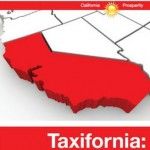California politicians love to tax like the French
By Chriss Street
Support for Proposition 30, the income and sales tax increase touted by Gov. Jerry Brown, has fallen below the critical 50 percent needed for passage for the first time in the California Field Poll. With just two days to go before the election and polls showing support for Prop. 30 fading, the teachers and other public employees unions are desperately spending fortunes trying to get voters to rescue their lifestyles.
Unfettered by the risk of the initiative failing, Brown and state politicians have increased deficit spending this year by more than the $6 billion Prop. 30 might bring in. “Taxifornia” is already suffering from wealth and business flight as the third worst tax burden in the U.S, but California politicians love to tax like the French.
The California Teachers Association is independently spending $1 million a day in advertising for passage of Prop. 30 in the Los Angeles media market, on top of the $8.8 million it gave to the official Yes on Prop. 30 campaign. No one is surprised that the largest official contributor group supporting the initiative would be unions, but it is perplexing that the second largest contributor class is multinational beverage companies. Coca-Cola donated $1.9 million, PepsiCo furnished $1.5 million, Dr. Pepper-Snapple gave $0.7 million and assorted other beverage folks chipped in $0.6 million. Undoubtedly, the sugary soda folks are in for some serious crony payback.
The No on Prop. 30 push is being led by the Howard Jarvis Taxpayers Association. The largest contributor is Charles Thomas Munger Jr., who has given over $55 million. Other large donators are Americans for Responsible Leadership, which gave $11 million, and the Small Business Action Committee PAC, which gave $9 million.
A disaster — or inconsequential?
The Field Poll found:
“Californians divide into two approximately equal size camps when asked whether they believe the state can continue to provide roughly the same level of services it now does if its budget had to be reduced by $6 billion. Statewide 48 percent think that it can, while 44 percent disagree. Of those who foresee little impact on public services most are voting No on Prop. 30.”
In a brilliant political shakedown move, Brown and the California Legislature passed a budget that would give school districts a way to deal with “trigger” cuts that would result if Prop. 30 fails: legal clearance to cut the school year by up to 14 days. The Field Poll determined that …
“58 percent of voters are very concerned about the potential impact that the automatic spending cuts that would be imposed should Prop. 30 be defeated. Among this group, support for Prop. 30 is running greater than three to one (68 percent to 20 percent).”
The doomsday threat seems to have been effective motivating certain target groups:
* Women support Prop. 30 by a 17-point advantage of 50 percent versus to 33 percent;
* Independents supported the tax increase by 18 percent at 52 percent to 34 percent;
* Renters back the initiative by nearly two to one.
Men are split within the poll’s margin of error at 46 percent “Yes” and 43 percent “No.” Homeowners are also divided equally in their views of Prop. 30. Geographic support is predominantly the Bay Area and Northern California versus Central and suburban Southern California.
The lying-to-pollsters factor
Historically, about 5 percentage points of people interviewed in a telephone poll falsely indicate their support for government and taxes, which means the “real” poll numbers are 43 percent “Yes” and 38 percent “No.” Voters who are undecided on tax initiatives by Election Day tend to be people who have not been persuaded by the dog-and-pony show in support of picking their pocket. Consequently, it appears Prop. 30 is headed for a close defeat.
California politicians are desperate to avoid the reality that the state is deeply insolvent and becoming more so every day. In the first two months of the budget year through September, California’s budget is already upside down by $1.2 billion and the state had to increase barrowing by $2 billion to an obscene $22 billion to just keep the lights on. If you multiply the first quarter shortfall by four, it is obvious that the $6 billion Prop. 30 tax increase will only go to paying for the current deficit and do nothing to improve schools.
With credit rating agencies threatening a downgrade California’s debt to “junk bond” status and a slew of cities headed for bankruptcy court, passage of the Prop. 30 tax increases will accelerate the persistent state budget deficits caused by the flood of the wealthy and small businesses abandoning California for the lower tax rates of Texas and Nevada. New York City Mayor Michael Bloomberg summed up what happens when the wealthy are walloped by government: “You saw in France people moving out when they raised the tax rates,” the mayor said. “Whether you like it or not, the wealthy are mobile.”
Chriss Street appears on “THE AMERICAN EXCEPTIONALISM RADIO TALK SHOW.”
Streaming live Monday through Thursday from 7-10 p.m.
Click here to listen: www.edtalkradio.com
Please call in at 530-742-5555
Related Articles
Greenlining Series: Born in civil rights era
This is the second part in a series of articles about the radical Greenlining Institute produced by CalWatchdog and the
Illegals may get more ed aid
JUNE 23, 2010 By LAURA SUCHESKI The Assembly Higher Education Committee considered the SB1460 California Dream Act this afternoon, a
Brown's Budget Shifts Much To Localities
JAN. 10, 2010 By WAYNE LUSVARDI Gov. Jerry Brown’s budget fix is a topic of statewide social conversation but often



